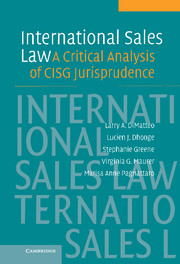Book contents
- Frontmatter
- Contents
- Preface
- Acknowledgments
- 1 INTRODUCTION
- 2 CISG METHODOLOGY AND JURISPRUDENCE
- 3 FORMATION: WRITING REQUIREMENTS
- 4 FORMATION: OFFER AND ACCEPTANCE RULES
- 5 OBLIGATIONS OF BUYERS
- 6 OBLIGATIONS OF SELLERS
- 7 COMMON OBLIGATIONS OF BUYERS AND SELLERS
- 8 BREACH OF CONTRACT BY SELLER
- 9 BREACH OF CONTRACT BY BUYER
- 10 DAMAGES, EXCUSE, AND PRESERVATION
- 11 SUMMARY AND OBSERVATIONS
- TABLE OF AUTHORITIES AND CASES
- APPENDIX A: UNITED NATIONS CONVENTION ON CONTRACTS FOR THE INTERNATIONAL SALE OF GOODS (CISG) (APRIL 11, 1980)
- APPENDIX B: CISG: TABLE OF CONTRACTING STATES (AS OF FEBRUARY 8, 2005)
- Index
5 - OBLIGATIONS OF BUYERS
Published online by Cambridge University Press: 06 August 2009
- Frontmatter
- Contents
- Preface
- Acknowledgments
- 1 INTRODUCTION
- 2 CISG METHODOLOGY AND JURISPRUDENCE
- 3 FORMATION: WRITING REQUIREMENTS
- 4 FORMATION: OFFER AND ACCEPTANCE RULES
- 5 OBLIGATIONS OF BUYERS
- 6 OBLIGATIONS OF SELLERS
- 7 COMMON OBLIGATIONS OF BUYERS AND SELLERS
- 8 BREACH OF CONTRACT BY SELLER
- 9 BREACH OF CONTRACT BY BUYER
- 10 DAMAGES, EXCUSE, AND PRESERVATION
- 11 SUMMARY AND OBSERVATIONS
- TABLE OF AUTHORITIES AND CASES
- APPENDIX A: UNITED NATIONS CONVENTION ON CONTRACTS FOR THE INTERNATIONAL SALE OF GOODS (CISG) (APRIL 11, 1980)
- APPENDIX B: CISG: TABLE OF CONTRACTING STATES (AS OF FEBRUARY 8, 2005)
- Index
Summary
This part focuses on the duties of buyers in the CISG-governed transaction. Given the limited right of rejection (avoidance) provided to the CISG, the buyer is burdened with numerous duties including the duty to inspect, give notice of nonconformity, give notice of avoidance, duty to preserve the goods, duty to pay the price, and duty to take delivery. The analysis reviews how courts and arbitral panels have defined the duties enunciated in the CISG.
THE DUTY TO INSPECT, GIVE NOTICE, AND PRESERVE GOODS
The CISG requires buyers to inspect goods, and provide adequate and timely notice, with respect to any defects in the seller's performance and preserve the goods in the event the buyer elects to reject the seller's tender. These obligations are set forth in Articles 38, 39, 44, and 86. The initial obligation of all buyers is the duty of inspection. Article 38 provides that the buyer “must examine the goods, or cause them to be examined, within as short a period as is practicable in the circumstances.” Special rules apply in the event the contract involves the carriage of goods or their redirection in transit. Examination may be deferred until after the goods arrive at their destination in the event the contract involves carriage. By contrast, examination of the goods may be deferred until after their arrival at their ultimate destination in the event they have been redirected in transit or redispatched by the buyer.
- Type
- Chapter
- Information
- International Sales LawA Critical Analysis of CISG Jurisprudence, pp. 76 - 100Publisher: Cambridge University PressPrint publication year: 2005

